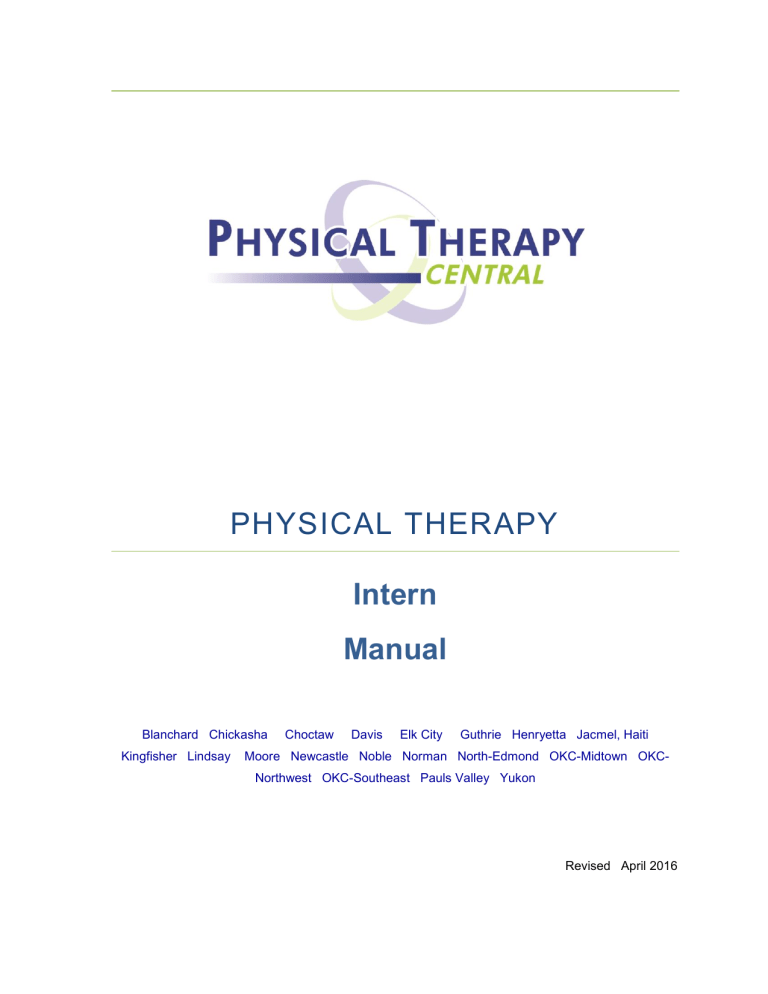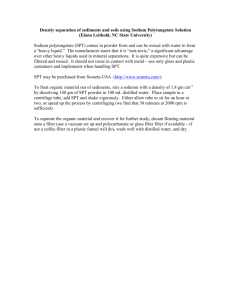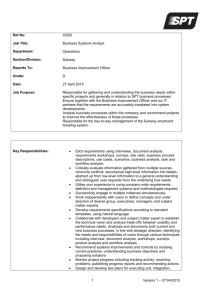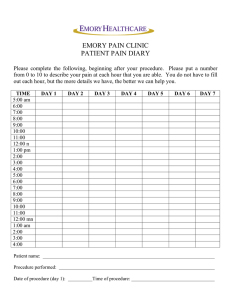
PHYSICAL THERAPY Intern Manual Blanchard Chickasha Kingfisher Lindsay Choctaw Davis Elk City Guthrie Henryetta Jacmel, Haiti Moore Newcastle Noble Norman North-Edmond OKC-Midtown OKCNorthwest OKC-Southeast Pauls Valley Yukon Revised April 2016 Table of Content I. Welcome Letter 3 II. Philosophy 4- 5 III. Orientation Checklist 6 IV. Introduction for Student Interns 7 V. Student Intern Objectives 8-10 VI. Clinical Education Models and Responsibilities 11 - 12 VII. Work Standards 13 - 15 VIII. Emergency Procedure 15 - 17 IX. Local Resources 17 X. Abbreviations 19 - 20 COPYRIGHTED MATERIAL Do not transfer or duplicate 2 W ELCOME TO OUR CLINIC Dear New Student Intern: We're very happy to welcome you to Physical Therapy Central. Thank you for joining us! We want you to feel that your association with us will be a mutually beneficial and pleasant one. You have joined a practice that has established an outstanding reputation for providing quality services. Credit for this goes to every one of our employees and interns. We hope you, too, will find satisfaction and take pride in your work here. This manual has been developed to clarify and establish formal guidelines for Physical Therapy interns at Physical Therapy Central. The procedures outlined will reinforce work standards, treatment guidelines, clinical education, and mentorship that will allow all of us to work more effectively together. We want to make sure that we are moving together toward common goals and set expectations. We hope to obtain and maintain an open relationship of trust and communication. All interns are encouraged to ask any questions about the intern manual and practice guidelines. If anything is unclear, please discuss the matter with your Clinical Instructor. You are responsible for reading and understanding this manual. We have found that interns’ learning depends on how much effort they put into this internship. We are here to guide you and mentor you through your internship, but you must seek knowledge for your growth to take place. PTC is a place where we are committed to helping you learn and providing an atmosphere that encourages you to do so. Each person involved with this clinic is essential for its success. We are glad that you are part of what we are doing. Each and every team member makes a statement about the quality of care that we extend to our patients. We extend to you our personal best wishes for your success and growth as a physical therapist during your time at our clinic. Best Regards, Jake Shockley, PT, OCS, COMT, FAAOMPT Director of Clinical Education Please read the manual and remember how to access the manual as needed. COPYRIGHTED MATERIAL Do not transfer or duplicate 3 Philosophy of Care The philosophy of Physical Therapy Central is to provide evidenced based physical therapy services. Meeting the individual needs of each patient is of the utmost importance, as is assisting the patient to achieve their goals. The care provided to the patients of Physical Therapy Central should be customized to meet their individual needs and goals. A strong emphasis is placed upon detailed evaluation and patient education. It is important that our patients understand the cause, the treatment and the prevention of their condition. Our patients are encouraged to accept responsibility for their rehabilitation and actively participate in a home management program. Physical Therapy Central is founded on the commitment to excellence as an innovative outpatient clinic. The clinic believes in the importance of providing comprehensive musculoskeletal evaluation and treatment in an environment that is positive and friendly. Incorporating a health promotion and injury prevention approach to medical care is of primary focus. The philosophy of Physical Therapy Central supports the development of a model clinic in terms of patient and community education, programming, clinical education, research, administration, and professional development. A team approach is utilized to provide services for all patients. Vision To embrace clinical education on a peer-to-peer basis so that the mentor and student can provide evidence based world class physical therapy. Mission To guide the student intern from beginner to beyond entry-level performance. COPYRIGHTED MATERIAL Do not transfer or duplicate 4 The Patients Our patients are the single most important part of our practice. Patients are our employers. We work for them. Patients are never an interruption of our work activities. Nothing matters as much as taking care of our patients’ individual needs. Remember -always- that we are here for the patient. They are not here for us. We build our practice on personal referrals from patients who become a part of our practice. We receive this type of confidence by concentrating our activities, words, and actions upon meeting the needs of our existing and potential patients. The level of care that we extend comes from the heart. It represents a sincere, caring attitude for each and every one of our patients. These qualities are not taught in school. You must listen and develop patience, understanding, empathy and humor. Physical Therapy is like a “ Dance; “ a dance between patient and therapist… full of tricky moves, pain, exhilaration, and ultimate teamwork and trust. Sometimes as new clinicians we focus so intently on the diagnosis and treatment protocol that we forget the patient. The more we learn about healing, the more we understand that the body, mind and soul have to work together for healing to occur. We cannot just treat a “neck” and expect exceptional results. We have to treat the patient. At Physical Therapy Central, we want to create an enthusiastic and warm atmosphere where patients can heal. COPYRIGHTED MATERIAL Do not transfer or duplicate 5 ORIENTATION CHECKLIST Review Intern Manual Student Desk Work hours, Parking, Meals Introduction to people in the department Tour of facility Schedule of meetings, in-services Date of the midterm and final evaluation Emergency Procedures Utilization of Office Staff / Techs Review Student Objectives / Outcomes / Goals Responsibilities of the Student and CI Discuss Learning and Teaching Styles What to do when the CI is not there What to do when the student is unable to come in to the clinic Unique Learning Experiences Available to the Student Student’s Phone Number / CI Phone Number How to Use Dropbox & Join Us on Facebook ______ Expected Case Load ______ How to Use RevFlow for Documentation & MedBridge (HEP) ______ Utilization of patient Care and Loyalty Survey’s COPYRIGHTED MATERIAL Do not transfer or duplicate 6 Introduction “The effort of resolution…to the achievement of this purpose. I found to be…as if I had to make up my mind to leap from the top of a high house, or plunge into a great depth of water: - “Pip” Great Expectations By Charles Dickens Many of the participants in the clinical education experience may have feelings similar to those of the Dickens character Pip; taking part in clinical education may feel like taking a plunge into unknown depths. Every student that participates in clinical education will come to the clinic with different expectations. If the expectations are not clearly communicated, those involved could definitely feel as though they are making a leap of faith into the experience. To avoid any pitfalls, the expectations of the clinic are listed below. Clinical Instructor Expectations of Interns Arriving on time, or early Dressing appropriately and professionally Knowing when to help without being asked – we expect you to get involved. Being motivated, enthusiastic, and showing interest in clinical education Accepting and using complimentary and constructive feedback on performance Demonstrating appropriate self-confidence Showing adaptability and professionalism Performing at the level appropriate to educational and clinical background Being well-prepared to apply didactic course work to the clinical setting- you may need to study and review prior to the clinical rotation Providing the clinical instructor with constructive feedback about the educational experience Adhere to policies and procedures of Physical Therapy Central Discuss misunderstandings and problems as they occur Adhere to our Core Values We would like for you to write out your expectations of the clinical instructor and we will discuss the list with you by the end of the first week. COPYRIGHTED MATERIAL Do not transfer or duplicate 7 Student Expectations of the Clinical Instructor Expectations of the Consumer Perhaps the most important participant in the clinical education process is the consumer of physical therapy services. The patient who is treated by the intern expects to be treated by a competent, knowledgeable, and professionally trained individual. These expectations do not change when an intern provides the treatment. Every clinical instructor must strike a balance between “concern for the patient and concern for the learner” and make decisions about patient assignment that are in the best interest of both the patient and the intern. If you feel overwhelmed, or uncomfortable please ask your CI to step in and work with the patient. It is appropriate to ask for help and feedback, you are a student and the objective is to learn. Never treat a patient that you are not comfortable treating or you do not have the skill to treat. General Goals and Objectives: Upon completion of your internship you will be able to: 1. Exhibit a comprehensive knowledge of orthopedic related anatomy. 2. Be able to use evidenced based clinical decision making. 3. Educate patients about the anatomy, function and rehabilitation of common orthopedic dysfunctions. 4. Instruct patients in the independent home management for their condition and provide a written home exercise program. 5. Demonstrate professional communication skills with patients, physicians, adjustors, and physical therapy department staff members. 6. Be able to think on your feet and adaptable to change. 7. Provide effective and efficient treatment in a timely manner. COPYRIGHTED MATERIAL Do not transfer or duplicate 8 Second Year Student Physical Therapist (SPT) Goals and Objectives Midterm 1. SPT will demonstrate solid understanding of contraindications, precautions, and indications for outpatient PT interventions including but not limited to: manual therapy, therapeutic exercise, modalities and demonstrate no red flags with CPI #1-5. 2. SPT will complete independent chart review and subjective history on initial evaluations to arrive at a differential diagnosis of 2-3 probable conditions to begin the objective physical therapy examination. 3. SPT will appropriately select/perform reasonable tests/measures and select/interpret special tests for patients with simple orthopedic conditions involving the peripheral joints with <50% CI assistance. 4. SPT will independently manage at least 25% full time PT caseload of approximately 3-4 patients per day including daily notes, modification of therapeutic exercise or manual therapy interventions, goal settings, and discharge planning. 5. SPT will independently and competently perform both upper and lower quadrant scan exams with appropriate knowledge of myotomes, dermatomes, DTRs, and special tests to determine appropriateness of physical therapy. Final 1. SPT will understand concept of illness scripts in the subjective history and objective testing to determine probable hypotheses for simple peripheral and spinal conditions (i.e. Plantar fasciitis, patellofemoral dysfunction, lateral epicondyalagia, inflammation, grade II ankle sprain, lumbar disc herniation, etc). 2. SPT will independently complete initial evaluations and arrive at an appropriate physical therapy diagnosis on simple outpatient orthopedic peripheral and spinal conditions (mechanical LBP, disc herniation, stenosis) with 25% CI assistance and complex patients with 50-75% CI assistance by final. 3. SPT will independently manage at least 50% full-time caseload of approximately 6-8 patient per day including daily notes, Medicare POC, progress notes, goal settings, modification of manual therapy or therapeutic exercise, and discharge planning. 4. SPT will appropriately select/perform reasonable tests/measures and select/interpret special tests for patients with simple orthopedic conditions involving the peripheral joints and spine independently with at least 80% consistency by final. 5. SPT will document a full patient evaluation including subjective history, examination/evaluation, physical therapy diagnosis, and goals on patients with simple peripheral joint or spinal involvement with minimal cues from CI by final. COPYRIGHTED MATERIAL Do not transfer or duplicate 9 Third Year SPT Objectives Midterm 1. SPT will demonstrate solid understanding of contraindications, precautions, and indications for outpatient PT interventions including but not limited to: manual therapy, therapeutic exercise, and modalities. 2. SPT will independently complete initial evaluations and arrive at an appropriate physical therapy diagnosis for outpatient orthopedic patients with simple peripheral joint, spine, and neuromuscular conditions with at least 80% consistency within 30minutes. 3. SPT will independently manage at least 50% full-time physical therapy caseload of approximately 6-8 patients per day including daily notes, progress notes, goal settings, modification of manual therapy or therapeutic exercise, and discharge planning. 4. SPT will understand concept of illness scripts in the subjective history and objective testing to determine probable hypotheses for simple peripheral and spinal conditions (ie. Plantar fasciitis, patellofemoral dysfunction, lateral epicondyalagia, inflammation, grade II ankle sprain, lumbar disc herniation with and without radiculopathy, etc). Final 1. SPT will be competent and safe with advanced screening procedures to determine appropriateness of physical therapy for patients presenting with symptoms of but not limited to: upper cervical instability, VBI, headaches, dizziness, myelopathy, cauda equina syndrome. 2. SPT will independently complete initial evaluations and arrive at an appropriate physical therapy diagnosis for outpatient orthopedic patients with simple and complicated peripheral joint, spine, MVA, or neuromuscular conditions with at least 80% consistency within 60 minutes. 3. SPT will independently manage a 100% full-time physical therapy caseload of approximately 12-16 patients per day including daily notes, Medicare POC, progress notes, goal settings, modification of manual therapy or therapeutic exercise, and discharge planning. 4. SPT will understand concept of illness scripts in the subjective history and objective testing to determine probable hypotheses for complex peripheral and/or spinal conditions (ie. Lumbar instability, VBI, fracture, cauda equina, spinal stenosis, etc). COPYRIGHTED MATERIAL Do not transfer or duplicate 10 SPT Assistant Objectives 1. SPT assistant will demonstrate solid understanding of contraindications and precautions for outpatient PT interventions including but not limited to: manual therapy, therapeutic exercise, modalities and demonstrate no red flags with CPI #1-5. 2. SPT assistant will be independent in chart review, preparation of treatment, and appropriate positioning/draping in a timely manner. 3. SPT assistant will demonstrate competency in performing components of data collection to include but not limited to; aerobic capacity, proper use of assistive device, gait, posture, joint integrity, muscle performance, ROM, pain, and community/work reintegration. 4. SPT assistant will independently treat at least 25% full time PT caseload of approximately 3-4 patients with basic cases per day including daily notes, instruction/supervision of therapeutic exercise, and performance of peripheral manual therapy interventions by midterm. (Second and/or third rotations only). 5. SPT assistant will independently treat at least 50% full time PT caseload of approximately 6-8 patients with basic cases per day including daily notes, instruction/supervision of therapeutic exercise, and performance of peripheral manual therapy interventions by final. (Second and/or third clinical rotations only). Clinical Education Models At PTC we are dedicated to improving your ability to work with patients and achieve good patient outcomes. This starts with learning how to communicate and how to take a good patient history. To succeed as a physical therapist, the first thing you have to be able to do is communicate with your patient. The pre internship content (linked below) will assist you in conducting a good interview with your patients. Please view the videos below prior to your start date. 1. About Physical Therapy Central 2. New Employee Orientation 3. Medical Interview – The 4 Habits Model Physiopedia is the go to spot for our students. This site contains all student information that you will be required to know as well as a resource for future learning and collaboration. The clinical education blocks are modules to further build your clinical skills. The blocks contain articles, videos, and clinical reasoning activities. Each block has checklists to be completed before moving on to the next block. You and your clinical instructor will determine the pace required to complete all of the blocks prior to the end of your rotation. The long-term students will also be required to post their case studies as well as the other projects by the students. COPYRIGHTED MATERIAL Do not transfer or duplicate 11 CLINICAL INSTRUCTOR RESPONSIBILITIES Receive a thorough orientation on the first day Provide hands-on activities with selected patients Supervise the intern according to the level of expertise Instruction, guidance, and provide timely constructive feedback Make the intern feel comfortable about asking questions and making suggestions Feeling valued for suggestions made about patient care Will provide experience and work with a wide variety of patients Participating in in-services, videotapes and continuing education Remember that learning is not always easy or comfortable at this stage. We are expecting a lot from you – you must be able to bring to the new patient evaluation everything that you have learned you must be able to decide in a split second what you are going to do, what will you evaluate, what special tests to use then you must make a primary and secondary hypothesis put together a treatment plan provide hands on techniques provide a home exercise program educate the patient decide how many days a week to see the patient assist with scheduling It is not the CI responsibility to teach you or review your curriculum. If you are weak in a certain area, we expect you to review your books, notes, etc. Then come to your CI to refine your knowledge, ask specific questions and improve your hands on technique. All of this must be done in an efficient and effective manner. This is not an easy thing to accomplish. But when you leave Physical Therapy Central, you will be able to do this and much more. You will be functioning at or above entry level performance. You will have hands on skills and treatment techniques and will be able to treat patients independently. COPYRIGHTED MATERIAL Do not transfer or duplicate 12 WORK STANDARDS Patient Interaction At all times during your interaction with patients, it is of the most importance that your communication, both verbal and nonverbal, be positive and supportive. It is imperative that you demonstrate confidence while working with the patients. Throughout your interaction with patients, please take the opportunity to become personally involved in each patient and get to know the patient on both a personal and professional basis. Please be supportive in all comments, as well as concerned and empathetic when needed. Go the extra mile to make the patient feel comfortable and help them to feel successful in whatever task they achieve. Dress Code Physical Therapy Central dress code encourages a professional appearance. Please dress accordingly by wearing nice slacks and shirt. You are required to wear a name tag at all times. White lab coats are not required. Friday is casual days and ironed jeans with nice tennis shoes are permitted. T-shirts, shorts and sandals are not permitted. Area of Emphasis Our clinic population consists of orthopedic, spinal, and sports medicine patients. You should have a basic understanding of anatomy of the spine, knee, shoulder and ankle. Review common muscles, ligaments, bones, bursae, discs, facet joints, nerves, dermatomes and myotomes. You will also need to review special tests for the knee, shoulder, ankle and spine. Our clinic provides specialized programs in the following areas: manual therapy and spinal dysfunction. Each CI has a strong emphasis in muscle energy techniques and Cyriax based evaluations that consist of Scan exams and selective tissue tension tests. The orthopedic manual therapy examination consists of a differential diagnosis and a biomechanical evaluation. The material is developed by the North American Institute of Orthopedic Manual Therapy (NAIOMT) and will be reviewed during your internship. Student Intern Hours Your clinical hours will mirror your clinical instructor’s work hours. Most of our clinics are open from 7:00 a.m. to 7:00 p.m. Every therapist works slightly different hours. Prior to your first day you will receive information about your CI and your work hours. Please arrive at 8:00 am the first day of your internship. COPYRIGHTED MATERIAL Do not transfer or duplicate 13 Surgery Observation During your rotation, a surgery observation can be scheduled. Your CI will contact a doctor and plan time in your schedule. Talk with your CI early in the rotation so that a surgery observation can be scheduled. Clinical Skills The clinical skills will be discussed and completed during your internship on a weekly basis. During the first week your CI will discuss specific skills that will need to be completed. It is your responsibility to update the needed paperwork and provide it to your CI on a weekly basis. Lunch You may bring your lunch or go out. The department has a refrigerator, microwave, toaster and oven that you may use. There are many fast food restaurants that are close by. In-service Student in-services will be schedule from 12:30 to 1:30 during our clinical review meetings which are the last Wednesday of each month. You will be asked to present one in-service for the physical therapy staff members. The subject matter and date will be decided upon by you and your CI. You will be expected to comply with your University’s requirements for this presentation. Case study presentation/discussion involving a patient at PTC can be used for your in-service. Check out physiopedia for examples from previous students. Location / Parking Physical Therapy Central has sixteen locations; Blanchard, Chickasha, Choctaw, Davis, Elk City, Jones, Midtown OKC, Moore, N. Edmond, Noble, Norman, Newcastle, Northwest OKC, Pauls Valley. During your internship you will work at only one location. This will be coordinated prior to your start date. See our web page for driving directions and maps. www.ptcentral.org Absenteeism If you are ill or must miss a day of work, please notify your clinical instructor as soon as possible. You may call them at home or at work. It will be left up to your clinical instructor’s discretion if the time will need to be made up. Give your CI your cell phone number, if the daily schedule changes then they can call you. COPYRIGHTED MATERIAL Do not transfer or duplicate 14 Health Requirements Proof of yearly TB, MMR and CPR certification are required and must be submitted to your clinical instructor. It is the student’s responsibility to provide documentation of the immunizations and current CPR card. Orientation Your first day at the clinic will be spent observing your clinical instructor, touring the facility, meeting the staff. During your first day you will shadow your CI. At the end of the first week you will have completed the orientation check list included in this manual. EMERGENCY PROCEDURES All injuries or medical emergencies will be handled in an appropriate and immediate manner. The physical therapist is responsible for preventing further injury or progression of the condition until further medical assistance arrives, initiating appropriate first aid procedures, and contacting appropriate first aid procedures, and contacting 911 emergency services. In the event of an injury/accident, or suspected life threatening cardiac or pulmonary medical emergency in the clinic, the first course of action is to protect the patient from further injury and initiate the appropriate first aid procedure. If necessary, CPR should be initiated. If the nature of the emergency is severe and medical emergency service is required, the emergency 911 system should be activated immediately. If an ambulance is necessary, provide the name of Physical Therapy Central, the address, telephone number, and the nature of the medical emergency. The patient status should be monitored until appropriately trained individuals arrive on the scene. If the emergency is significant in nature, the area should be cleared from observers. Once the assessment and treatment has been initiated the patient's family and referring physician will be notified as soon as possible. COPYRIGHTED MATERIAL Do not transfer or duplicate 15 In the event that a patient in the clinic becomes ill or in need of medical evaluation for a non-life threatening condition, the physical therapist will make arrangements for appropriate transfer from the clinic to the office of Dr. Steven Cox, D.O. (this is for the Norman clinic, talk to your CI for your local doctor). Dr. Steven Cox, D.O. 905 24th Ave. N.W., Suite B Norman, OK 73069 (405) 292-3060 In the event that Dr. Cox is not available, the patient should be transferred to the Norman Minor Emergency Clinic located at: 800 24th Ave. N.W. Norman, OK 73069 (405) 321-7100 The family member or friend whose name appears on the patient history form will then be contacted. Documentation of any medical emergency will be completed by the physical therapist within a 6-hour period. The incident form utilized by the clinic will be completed and a letter will then be sent to the referring physician with the originals kept as medical records in the patient's chart. A follow-up call will be made by the physical therapist to the patient within 23 hours after the emergency. CODE RED PURPOSE: To provide a plan of action that ensures patient and personnel safety in the Physical Therapy clinic in the event that a fire may occur and require the relocation of staff, patients, and visitors. POLICY: The clinic personnel will know and respond calmly and appropriately to the "Code Red" notification and follow the guidelines closely. COPYRIGHTED MATERIAL Do not transfer or duplicate 16 PROCEDURE: 1. Dial 911, identify yourself to the dispatcher and state that there is a fire. Give the exact location of the building and the fire. 2. Notify the Physical Therapists. 3. Announce verbally and loudly "Code Red". 4. Remove all patients from the clinic to the parking lot. 5. If possible, attempt to contain the fire or extinguish the fire. 6. Close all doors in the area surrounding the area and the department. 7. Check all bathrooms, treatment room, offices, etc. to be certain no one remains in the building in the event of evacuation. Prior to Coming to Norman you can check out a few local sites: You can use the following links to find out more about Norman Oklahoma: Newspaper: www.normantranscript.com University of Oklahoma: www.ou.edu Physical Therapy Central: www.ptcentral.org Oklahoma City Chamber of Commerce: www.okcchamber.com News: www.newsok.com Health Club or Fitness One These are nearby health clubs that will allow you to pay by the month and use the facility. It is fully stocked with cardiovascular and weight equipment. See the web page listed at the end of this manual. OKC Thunder COPYRIGHTED MATERIAL Do not transfer or duplicate 17 You are going to have a great time. We look forward to working with you. If you have any questions, please don’t hesitate to call or email the clinical education coordinator. The Physical Therapy Central web site will give you pictures of the clinic, address and therapists biographies for our nineteen locations. Best Regards, Jake Shockley, PT, OCS, COMT, FAAOMPT Director of Clinical Education jshockley@ptcentral.org COPYRIGHTED MATERIAL Do not transfer or duplicate 18 APPENDIX Abbreviations The following is a list of abbreviations will be used in the patient charts: Single/Double knee to chest SKC/DKC Straight leg raise SLR Quad set QS Short/Long arc quad SAQ/LAQ Hamstring HS Flexion FLEX Extension EXT Rotation ROT Both/bilateral B Rotator cuff RC External/Internal rotation ER/IR Piriformis PIR Quadratus lumborum QL Flexor hallucus longus FHL Tensor fascia lata TFL Passive range of motion PROM Active range of motion AROM Racquetball RB Cervical and thoracic C-T Thoracic and Lumbar T-L Joint mobilization (Therapist ONLY) Jt. Mob Manual traction (Therapist ONLY) Man Tx Myofascial release (Therapist ONLY) MFR Interferential current IFC Nuero-muscular stimulation NMS COPYRIGHTED MATERIAL Do not transfer or duplicate 19 Iontophoresis IONTO Cervical traction SCTX Eccentric abdominals ECC ABS Concentric abdominals CON ABS Sitting on ball SOB Eccentric quads ECC QUADS Ultrasound US Supraspinatus SUP Infraspinatus INF Whirlpool WP Vibration VIB Left/Right L/R Single leg SL Side lying S/L Recumbent REC Elliptical rider ELLIP Biomechanical ankle platform system BAPS Vertical row VERT ROW Lower trapezius LOW TRAP Treadmill TM Abduction ABD Adduction ADD Posterior pelvic tilt PPT Total gym TG Phonophoresis PHONO Cold pack CP COPYRIGHTED MATERIAL Do not transfer or duplicate 20



